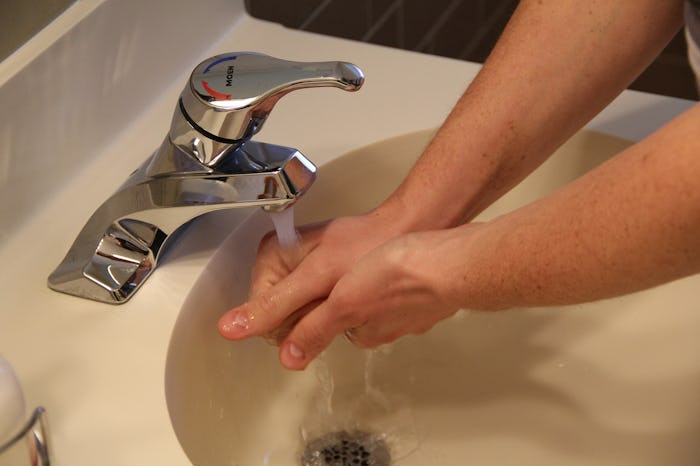Life
FDA Says Antibacterial Soaps Don’t Actually Do Anything, So Here Are A Few Alternatives
Heads up, germaphobes, it's time to stock up, because triclosan is getting phased out in the next year. After decades of debate with the Food and Drug Administratio, manufacturers were unable to prove that the controversial ingredient was either safe or effective, so the FDA has effectively banned antibacterial soap. Companies will have one year to remove triclosan and triclocarban from their hand and body washes, reported NBC News. Bans on the less common benzalkonium chloride, benzethonium chloride, and chloroxylenol will be deferred an additional year in order to give manufacturers a sporting chance at proving that they're acceptable, but 93 percent of antibacterial soaps are currently using triclosan as their active ingredient.
The FDA has been questioning the legitimacy of antibacterial soap since 1978, but it wasn't until 2013 that they finally cracked down, asking soap companies to submit data that showed that the products were safe and effective. Apparently, they failed. Triclosan hasn't been proven to be harmful to humans, but studies have suggested that it can cause hormone disruption in rats. According to NBC, it kills bacteria by breaking open the cell walls, but the process takes "several hours." Those with hand washing experience will note that the process typically lasts only as long as it takes to sing "Happy Birthday" twice, which is significantly less time than it takes for triclosan to actually work. So what does work?
Normal Soap
Hand washing: it's so simple, even a lizard can do it! Man, I should really write ad copy. Although the World Health Organization inexplicably breaks hand washing down into a 10-step process, it's really very simple, and it really does take care of germs and bacteria quite effectively, even with regular soap. Fun fact: Hungarian doctor Ignaz Semmelweis first came up with the idea of hand washing as a means of preventing the spread of disease just 150 years ago, and the idea was so thoroughly rejected, he was actually committed to an asylum for the wacky notion, where he was later beaten to death by guards. Oh, did I say "fun"? I mean "tragic and disturbing," sorry.
Hand Sanitizer
Washing your hands with soap and running water is still the gold standard, but when that's not possible, the Centers for Disease Control and Prevention recommend using a hand sanitizer that contains at least 60 percent alcohol. Beware, though, that the FDA is getting suspicious of these products, as well, according to CNN, and not just because little kids routinely get accidentally drunk off of them.
Wipes
Hand sanitizer can kill germs, but it doesn't remove dirt or debris. What about when there's no running water, but there's something nasty on your hands? If you're a parent, you probably already know that you should have a pack of wipes with you at all times. If you're not, close your eyes and think back, and you'll probably remember that mom always had a canister of Wet Ones rolling around in the back of her station wagon. Mom was right. Wipes for life. Wipes for kids, wipes for adults. Wipes in the car, wipes in the purse. Sorry, environment, but I am firmly on Team Wipes.
Glove Up?
Or, hey, you could just not touch anything. Wear latex gloves all the time, changing them whenever you move on to a new activity. But personally, I'd probably go with one of the other options.
